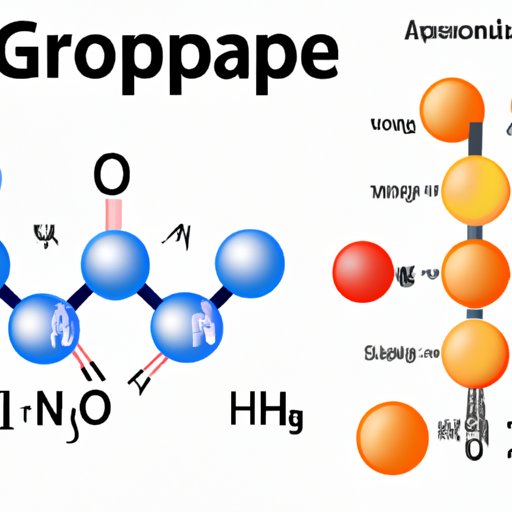Introduction
Have you ever wondered what makes a carbohydrate different from other essential molecules in your body? Understanding the chemistry behind carbohydrates, proteins, and lipids can be a challenge, but it’s vital to a healthy lifestyle. In this article, we will explore the science behind carbohydrates, proteins, and lipids, as well as other important molecules in your body. By the end of this article, you will have a deeper understanding of what molecule is not a carbohydrate and how these molecules work together in your body.
Chemistry 101: Distinguishing Carbs from Other Essential Molecules
Carbohydrates are organic compounds that serve as an essential source of energy for your body. They are made up of carbon, hydrogen, and oxygen atoms and are found in many foods, including grains, fruits, and vegetables. Carbohydrates are broken down by your body into glucose, which is used to fuel your cells and give you energy.
Proteins and lipids are two other essential molecules found in your body. Proteins are large complex molecules composed of amino acids that serve numerous functions in your body, including building and repairing tissues, transmitting signals, and providing energy when carbohydrates are not available. Lipids are also essential molecules found in your body that serve as a source of energy and play crucial roles in immune function, hormone production, and cell signaling.
Though all three molecules are crucial for optimal health, carbohydrates, proteins, and lipids have different structures and functions.
Breaking it Down: Why Protein Isn’t a Carbohydrate
Proteins are the building blocks of life, but they are not carbohydrates. Proteins contain nitrogen, unlike carbohydrates, which do not have nitrogen in their molecular structure. Proteins are made up of long chains of amino acids that are folded into complex three-dimensional structures. The shape and arrangement of proteins are responsible for their function in the body.
Proteins are essential molecules that serve many different roles in your body. They are vital for muscle growth and maintenance, healthy bones, and the production of enzymes and hormones.
The body processes proteins differently from carbohydrates, breaking them down into amino acids instead of glucose. Amino acids are then used to maintain and repair body tissues and create new protein structures in your body.
Unpacking the Science: Why Lipids Aren’t Carbohydrates
Lipids are another essential molecule in your body that serves as a source of energy. Unlike carbohydrates, lipids are not water-soluble and are not broken down into glucose. They are composed of fatty acids. Lipids are used for energy storage, insulation, and the production of hormones.
The molecular structure of lipids is also different from carbohydrates, composed of long chains of fatty acids attached to a glycerol molecule. The body processes lipids differently from carbs, breaking them down into fatty acids that are used for energy or stored as fat.
Beyond the Basics: Exploring Molecules That Aren’t Carbs
While carbohydrates, proteins, and lipids are the most well-known molecules in your body, there are many other essential molecules that are not carbs. Nucleic acids, like DNA and RNA, play crucial roles in gene expression and protein synthesis. Enzymes are important molecules that act as catalysts for chemical reactions in your body.
Though these molecules have different structures and functions, they interact and work together in many complex ways to ensure the proper functioning of your body.
The Carb-Free Molecule: Understanding Protein’s Role in Nutrition
While carbs are an essential source of energy, protein can also serve as a substitute for carbs in some diets. For example, the ketogenic diet emphasizes protein and fat consumption and minimal carb intake.
It’s important to note that protein and carbohydrates have different nutritional values. Carbs are generally easier for your body to break down and use as energy, while protein takes longer to digest. Additionally, excessive protein consumption can cause problems, such as kidney damage.
Getting to Know Your Molecules: The Differences Between Carbs and Proteins/Lipids
In conclusion, carbohydrates, proteins, and lipids are all essential molecules in your body with different structures, functions, and nutritional values. Understanding the differences between these molecules can help you make informed choices about your diet and your overall health.
If you’re interested in learning more about this topic, check out books and articles on biochemistry. There’s always more to learn about how your body works.
Conclusion
In conclusion, proteins and lipids are not carbohydrates. Proteins contain nitrogen and are essential for muscle growth and maintenance, healthy bones, and the production of enzymes and hormones. Lipids are an essential source of energy and play crucial roles in immune function, hormone production, and cell signaling.
Understanding the differences between these molecules can help you make informed choices about your diet and your overall health. Incorporate carbohydrates, proteins, and lipids into your diet to ensure that your body is getting the essential energy and nutrients it needs to function at its best.
